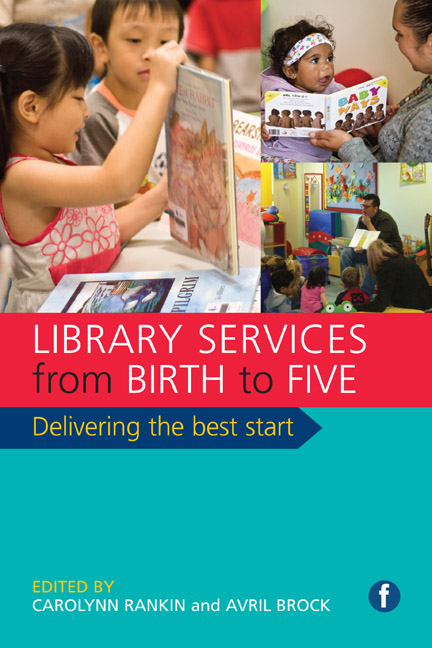Book contents
- Frontmatter
- Contents
- List of figures and tables
- Contributors
- Acknowledgements
- Introduction
- 1 Take them to the library: the pathway of opportunity
- 2 What you need to know about promoting early reading with young children from birth to five
- 3 Attribute value wrong, It should be `City of Literature ... it all starts with ABCD! The City of Melbourne and the Abecedarian Approach
- 4 Transforming practice through research: evaluating the Better Beginnings family literacy programme
- 5 People and partnerships, skills and knowledge
- 6 Resources for early years libraries: books, toys and other delights
- 7 Using digital media in early years library services
- 8 Using play to enhance early years literacy in babies and toddlers: ‘Read, Play and Grow’ at Brooklyn Public Library
- 9 Inclusive early literacy
- 10 Music and rhyme time sessions for the under-fives
- 11 Reaching your audience: the librarian's role
- 12 Successful library activities for the early years and ways to promote books effectively
- 13 Designing family-friendly libraries for the early years
- 14 Planning: organizing projects and money matters in the early years library
- Index
12 - Successful library activities for the early years and ways to promote books effectively
Published online by Cambridge University Press: 08 June 2018
- Frontmatter
- Contents
- List of figures and tables
- Contributors
- Acknowledgements
- Introduction
- 1 Take them to the library: the pathway of opportunity
- 2 What you need to know about promoting early reading with young children from birth to five
- 3 Attribute value wrong, It should be `City of Literature ... it all starts with ABCD! The City of Melbourne and the Abecedarian Approach
- 4 Transforming practice through research: evaluating the Better Beginnings family literacy programme
- 5 People and partnerships, skills and knowledge
- 6 Resources for early years libraries: books, toys and other delights
- 7 Using digital media in early years library services
- 8 Using play to enhance early years literacy in babies and toddlers: ‘Read, Play and Grow’ at Brooklyn Public Library
- 9 Inclusive early literacy
- 10 Music and rhyme time sessions for the under-fives
- 11 Reaching your audience: the librarian's role
- 12 Successful library activities for the early years and ways to promote books effectively
- 13 Designing family-friendly libraries for the early years
- 14 Planning: organizing projects and money matters in the early years library
- Index
Summary
Early years activities in libraries – and of course library books – can play a huge role in supporting babies’ and young children's learning and development. This chapter will consider that role and identify effective library activities and book promotion for under-fives.
The benefits of library activities for early childhood learning and development
The acronym SPICE is a very useful reminder of early childhood developmental needs:
Social
Physical
Intellectual
Creative
Emotional.
Libraries are well placed to nurture all of these. Many readers will have witnessed young children learning how to take turns in rhyme times, just one example of the ways libraries help social development. Successful rhyme times incorporate plenty of movement – evidence of support for physical development. Anyone who has given or watched a library story time for young children and listened to their questions and comments will be well aware of its value for intellectual development. Craft activities foster children's creativity. Lots of picture books are wonderful for emotional development, helping children's understanding of their own and others’ feelings.
Many countries define the areas of learning and development that should be supported in early years establishments. Libraries can and should bear these in mind when planning activities. This way they usefully complement what is happening in preschool settings and in the first years at school, so reinforcing children's learning. In addition, libraries can demonstrate their relevance to young children's education, making library visits more attractive to preschools and schools. In England the areas of the Early Years Foundation Stage (EYFS) (DfE, 2012) have much in common with those of other countries. The EYFS prime areas of learning are:
• communication and language
• personal, social and emotional development
• physical development.
There can be no question that libraries help communication and language. Rhyme and story times develop babies’ and young children's listening and attention skills, help them to understand the spoken word and communicate with others and increase their vocabulary. Such activities also play a valuable role in terms of personal, social and emotional development. We have already seen some examples, to which could be added the fact that regular attendance at library sessions helps young children learn to manage their feelings and behaviour, and begin to share.
- Type
- Chapter
- Information
- Library Services from Birth to FiveDelivering the best start, pp. 263 - 274Publisher: FacetPrint publication year: 2019
- 1
- Cited by



